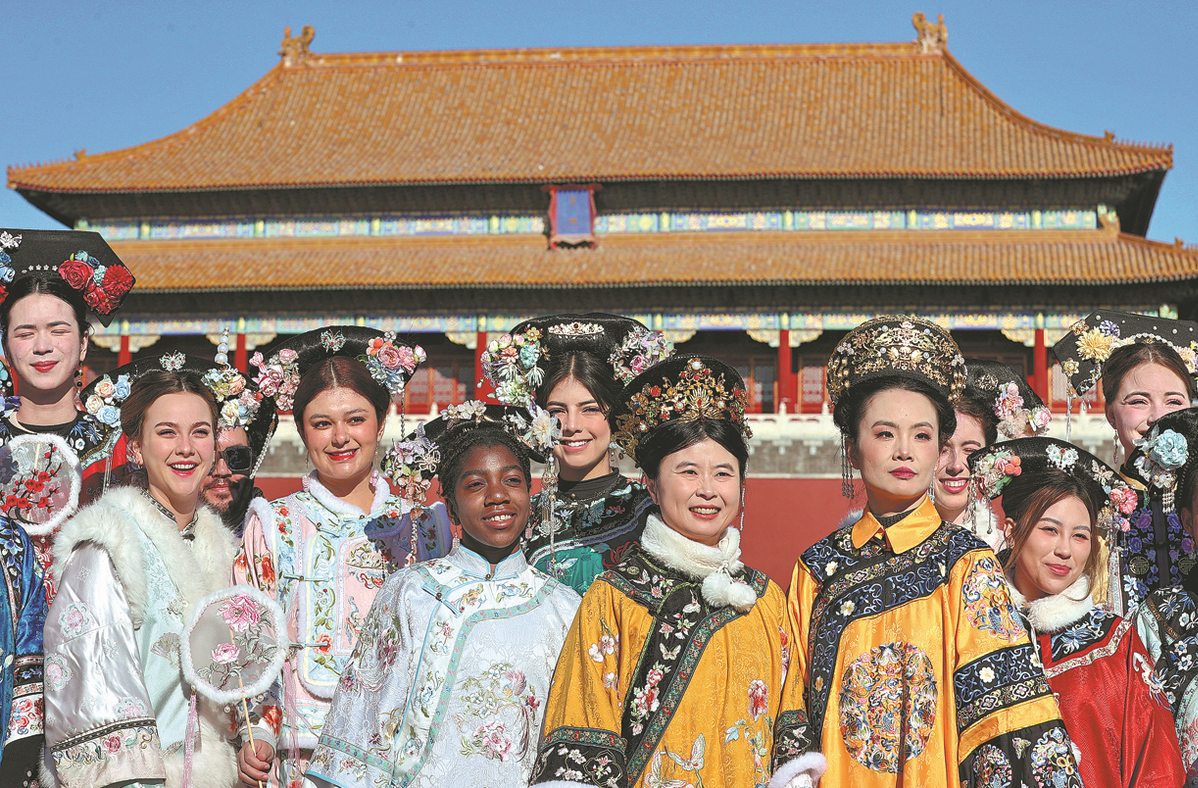
Foreign travelers dressed in Chinese traditional costumes pose for a photo on Friday at the Forbidden City in Beijing. WANG XIN/FOR CHINA DAILY
China saw a spike in foreigners' visits in 2024, a year in which the country kept stepping up efforts to beef up cross-border travel, statistics from the National Immigration Administration showed.
Last year, immigration authorities across the country saw more than 20.11 million visa-free trips to China made by foreign travelers, more than double the figure in 2023, Lyu Ning, a spokeswoman for the administration, said on Tuesday.
The authorities reported a total of 610 million inbound and outbound trips in 2024, a 43.9 percent year-on-year increase, Lyu said, adding that of these trips, 64.88 million were made by foreign citizens, up 82.9 percent year-on-year.
They also issued about 2.6 million visas to foreigners, a 52.3 percent year-on-year increase.
A series of policies that the NIA has introduced over the past year to facilitate inbound travel have led to a significant increase in the number of foreign visitors, Lyu said.
In a recent move, the NIA improved the country's visa-free transit policy in December, extending the period of stay to up to 10 days, and increasing the number of visa-free transit ports and places foreigners can visit under the policy.
The NIA also contributed to the country's efforts to expand the unilateral visa-free entry policy and apply it to more countries, Lyu said, adding that the administration will continue to unleash the benefits of the country's visa-free policies.
Lyu's remarks came a day after the State Council, China's Cabinet, called for further expansion of the visa-free entry policy and further extension of visa-free stays to foster new growth points in the culture and tourism sector and boost related consumption.
In November, China added nine countries to its unilateral visa-free entry list, increasing the number of such countries to 38, and extended the stay in China upon visa-free entry to 30 days.
These ongoing efforts have served as an impetus for inbound travel, tourist companies said.
Hu Jiying, deputy general manager of CYTS International Travel Co, said these favorable policies, especially the visa-free entry policy, are a boost to the domestic tourism market.
The visa-free entry policy has spared potential foreign travelers the money, time and labor needed to apply for a visa, and improved China's attractiveness as a tourist destination, Hu said, adding that the extension of stay time allows foreign tourists to plan for longer trips and visit more places in the country.
Hu said she believes that China's favorable policies will continue to yield greater effects and further strengthen the company's business in the coming year.
Trip.com Group, an online travel agency, said earlier this month that it has witnessed rapid growth in its inbound travel business as a result of the extension of visa-free transit stays and the continued expansion of China's visa-free entry policy.
The number of inbound travel orders it has received for the Spring Festival holiday — from Jan 28 to Feb 4 — saw a 203 percent year-on-year increase, the company said.
Lyu, the NIA spokeswoman, said that the administration will strengthen the monitoring of cross-border travel flows and the operation of ports, and issue travel advisories during the holiday.
It will also deploy sufficient workforce and open enough passage points to ensure that Chinese citizens spend no more than 30 minutes to pass through the ports during the holiday, she said.